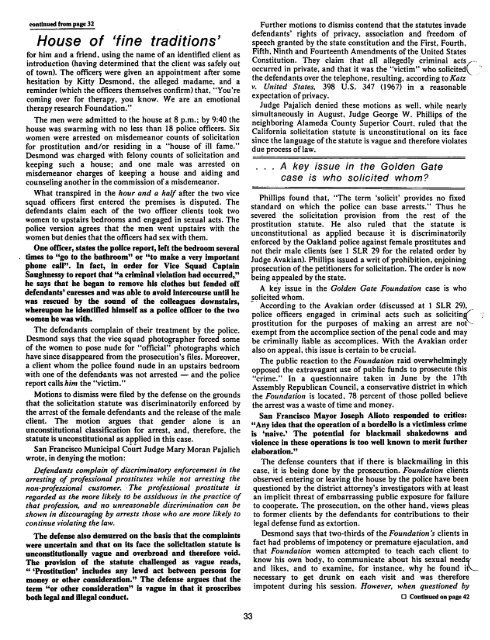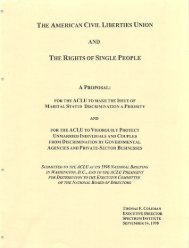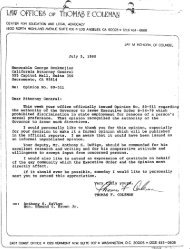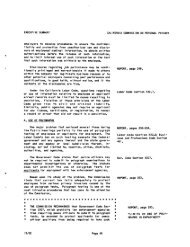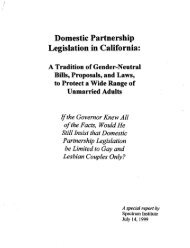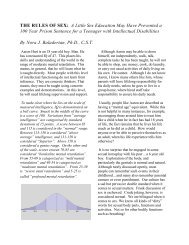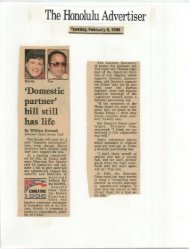1975 - Unmarried America
1975 - Unmarried America
1975 - Unmarried America
You also want an ePaper? Increase the reach of your titles
YUMPU automatically turns print PDFs into web optimized ePapers that Google loves.
I<br />
continued from page 32<br />
House of 'fine traditions'<br />
for him and a friend. using the name of an identified client as<br />
introduction (having determined that the client was safely out<br />
of town). The officer~ were given an appointment after some<br />
hesitation by Kitty' Desmond. the alleged madame. and' a<br />
reminder (which the officers themselves confirm) that. "You're<br />
coming over for therapy. you know. We are an emotional<br />
therapy research Foundation."<br />
The men were admitted to the house at 8 p.m.; by 9:40 the<br />
house was swarming with no less than 18. police officers. Six<br />
women were arrested on misdemeanor counts of solicitation<br />
for prostitution and/or residing in a "house of ill fame."<br />
Desmond was charged with felony counts of solicitation and<br />
keeping such a house; and. one male was ar~e~ted on<br />
misdemeanor charges of keepmg a house and aIdmg and<br />
counseling another in the commission of a misdemeanor.<br />
What transpired in the hour. and a half after the two vice<br />
squad officers first entered the premises is disputed. The<br />
defendants claim each of the two officer clients took two<br />
women to upstairs bedrooms and engaged in sexual acts. The<br />
police version agrees that the men went upstairs with the<br />
women but denies that the officers had sex with them.<br />
One officer, states the police report, left the bedroom several<br />
times to "go to the bathroom" or "to make a very important<br />
phone call". In fact, in order for Vice Squad Captain<br />
Saughnessy to report that "a criminal violation had occurred,~'<br />
he says that he began to remove his clothes but fended off<br />
defendants' caresses and was able to avoid intercourse until he<br />
was rescued by the sound of the colleagues downstairs,<br />
whereupon he identified himself as a police officer to the two<br />
women he was with.<br />
The defendants complain of their treatment by the police.<br />
Desmond says that the vice squad photographer forced some<br />
of the women to pose nude for "official" photographs which<br />
have since disappeared from the prosecution's files. Moreover.<br />
a client whom the police found nude in an upstairs bedroom<br />
with one of the defendants was not arrested - and the police<br />
report calls him the "victim."<br />
Motions to dismiss were filed by the defense on the grounds<br />
that the solicitation statute was discriminatorily enforced by<br />
the arr~st of the female defendants and the release of the male<br />
client. The motion argues that gender alone is an<br />
unconstitutional classification for arrest, and, therefore. the<br />
statute is unconstitutional as applied in this case.<br />
San Francisco Municipal Court Judge Mary Moran PajaHch<br />
wrote, in denying the motion:<br />
Defendants complain of discriminatory enforcement in the<br />
arresting of professional prostitutes whi/~ not arrest~ng th~<br />
non-professional customer . . The professional prostitute IS<br />
regarded as the more likely to be assiduo.us ~n ~he fractice of<br />
that profession, and no unreasonable d,scrlmmatlOn .can be<br />
shown in discouraging by arrests those who are more likely to<br />
continue violating the law.<br />
The defense also demurred on the basis that the complaints<br />
were uncertain and that on its face the solicitation statute is<br />
unconstitutionally vague and overbroad and therefore void.<br />
The provision of the statute challenged as vague ~eads,<br />
"'Prostitution' includes any lewd act between persons for<br />
money or other consideration." The defense argues that the<br />
term "or other consideration" is vague in that it proscribes<br />
both legal and illegal conduct.<br />
Further motions to dismiss contend that the statutes invade<br />
defendants' rights of privacy, association anc;1 freedom of<br />
speech granted by the state constitution and the First. Fourth.<br />
Fifth. Ninth and Fourteenth Amendments of the .United States<br />
Constitution. They claim that all allegedly criminal acts,'<br />
occurred in private. and that it was the "victim" who solicited" .. "<br />
the defendants over the telephone. resulting. according to Katz .<br />
v. United States, 398 U.S. 347 (1967) in a reasonable<br />
expectation of privacy.<br />
Judge Pajalich denied these motions as well, while nearly<br />
simultaneously in August. Judge George W. Phillips of the<br />
neighboring Alameda County Superior Court. ruled that the<br />
California solicitation statute is unconstitutional on its face<br />
since the language of the statute is vague and therefore violates<br />
due process oflaw.<br />
A key issue in the Golden Gate<br />
case is who solicited whom<br />
Phillips found that. "The term 'solicit' provides no fixed<br />
standard on which the police can base arrests.'· Thus he<br />
severed the solicitation provision from the rest of the<br />
prostitution statute. He also ruled that the statute is<br />
unconstitutional as applied because it is discriminatorily<br />
enforced by the Oakland police against female prostitutes and<br />
not their male clients (see 1 SLR 29 for the related order by<br />
Judge Avakian). Phillips issued a writ of prohibition. enjoining<br />
prosecution of the petitioners for solicitation. The order is now<br />
being appealed by the state.<br />
A key issue in the Golden Gate Foundation case is who<br />
solicited whom.<br />
_. According to the Avakian order (discussed at 1 SLR 29).<br />
police officers engaged in criminal acts such as solicitin( -;<br />
prostitution for the purposes of making an arrest are not<br />
exempt from the accomplice section of the penal code and may<br />
be criminally liable as accomplices. With the Avakian order<br />
also on appeal. this issue is certain to be crucial.<br />
The public reaction to the Foundation raid overwhelming~y<br />
opposed the extravagant use of public funds to prosecute thIS<br />
"crime. to In a questionnaire taken in .June. b~ t~e 1 !th<br />
Assembly Republican Council. a conservatIve dIstrIct In w~Ich<br />
the Foundation is located. 78 percent of those polled beheve<br />
the arrest was a waste of time and money.<br />
San Francisco Mayor Joseph Alioto responded to critics:<br />
"Any idea that the operation of a bordello is a victimless crime<br />
is 'naive.' The potential for blackmail shakedowns and<br />
violence in these operations is too well known to merit further<br />
elaboration. "<br />
The defense counters that if there is blackmailing in this<br />
case. it is being done by the prosecution. Foundation clients<br />
observed entering or leaving the house by the police have been<br />
questioned by the district attorney's investigators with at !east<br />
an implicit threat of embarrassing public exposure for fallure<br />
to cooperate. The prosecution. on the other h.and: views ple~s<br />
to former clients by the defendants for contrIbutIons to theIr<br />
legal defense fund as extortion.<br />
Desmond says that two-thirds of the Foundation's clients in<br />
fact had problems of impotency or premature ejaculati~n. and<br />
that Foundation women attempted to teach each chent to<br />
know his own body. to communicate about his sexual nee~S(<br />
and likes. and to examine, for instance, why he found It'<br />
necessary to get drunk on each visit and was therefore<br />
impotent during his session. However, when questioned by<br />
o Continued on page 42<br />
33


